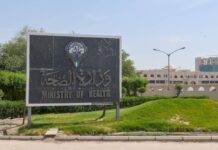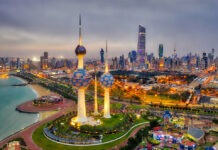The 38th Cabinet took its Constitutional Oath before Parliament on 30 March, in line with Article (91) of the Constitution, which states that ‘before assuming their duties in the National Assembly or in its committees, a member of the National Assembly shall take
the constitutional oath in a public session of Parliament’.
Following the oath taking ceremony, the National Assembly Speaker Marzouq Al-Ghanim opened the legislative session by announcing that the parliamentary seat of Dr. Bader Al Dahoum had become vacant, following a decision by the Constitutional Court to revoke his membership. The Speaker officially informed His Highness the Prime Minister of the vacancy and called on him to take the subsequent constitutional measures
to fill the vacancy.
The Speaker explained that as a result of the court ruling, a by-election will take place in the fifth constituency to fill the parliamentary seat left vacant as per Article (84) of the Constitution, which states that ‘if a seat in the National Assembly becomes vacant before the end of the term for any reason, the vacancy shall be filled by election within two months of the date of the announcement of this vacancy, and the term of the new member shall be until the end of the term of his predecessor.
Article (84) also states that ‘if the vacancy occurs within the six months preceding the end of the legislative session, no replacement member shall be elected’. Al-Ghanim added that the annulment of the membership of Dr. Al-Dahoum was “based on the ruling by the Constitutional Court on 14 March, which included three matters. The ruling annulled Al-Dahoum’s membership of parliament, which he won in general elections held on 5 December, 2020 from the fifth constituency, and accordingly his membership of the National Assembly ceased to be valid.
The Constitutional Court had in mid-March stripped Al-Dahoum of his parliament seat, on the grounds that he was ineligible from running in
elections. Earlier, in a press statement announcing the disqualification of Al-Dahoum, the parliament speaker had made clear that while he respects the viewpoints of all lawmakers on this issue, the topic will not be up for discussion or vote during the next session of parliament, as the matter was a Constitutional Court decision.
Accordingly, the National Assembly did not discuss the dismissal of one of its members. On the other hand, during its first session on 30 March Parliament approved the request of His Highness the Prime Minister to postpone deliberations on the grilling motions filed against him, until the end of the second round of the current legislative term.
Moreover, the grilling motion that MPs Thamer Al-Suwait, Khalid Al- Otaibi and Badr Al-Dahoum had filed against the prime minister earlier was
removed from the agenda due to the absence of these MPs. However, MPs Muhammad Al-Mutair, Badr Al Dahoum and Hamdan Al-Azmi had also filed a
grilling motion against the premier. Since Al-Azmi attended the session, the motion came up in the agenda and Sheikh Sabah Al-Khalid requested for postponement of the grilling. Al-Azmi opposed the request on the grounds that while the premier had the right to request for postponement of the grilling for two weeks, he could not ask for postponement until the next round of this parliamentary term.
It is telling that 16 legislators, including the now disqualified MP Dr. Al-Dahoum, were absent during this crucial session of parliament, leaving it wide open for 33 of the remaining attending parliamentarians to approve the request for postponement, with only one dissenting vote. The Assembly then approved the request of several MPs to cancel the session slated for Wednesday 31 March, and accordingly the Speaker announced that the next session of parliament would be held on 13 April.
Here is a quick recap of the slew of grillings and political drama that has ensued since the start of the 16th legislative term of Parliament in mid-December 2020. In January, soon after the inauguration of the new parliamentary term, three opposition MPs filed a motion to grill His Highness the Prime Minister Sheikh Sabah Al-Khaled Al- Sabah, with more than 30 lawmakers publicly declaring their support for the grilling.
Opposition lawmakers Thamer Al-Suwait, Bader Al-Dahoum and Khaled Al-Otaibi who jointly filed the grilling motion, accused the prime minister of ignoring the outcome of the general election by appointing provocative and unqualified ministers in the new Cabinet. They also accused him of interfering in the election of the speaker by supporting the candidate whom the majority of lawmakers rejected, saying this reflects a dangerous attitude.
They also accused him of violating the constitution by failing to submit the government’s program as required under the constitution. During the session, a number of MPs had called for filing a non-cooperation motion against the prime minister at the end of the grilling. To pass, the motion needs the support of just 25 lawmakers, but with more than 30 lawmakers voicing their support for the grilling, it was clear that the non-cooperation motion would be passed.
If the Assembly had voted to back the non-cooperation motion, the Constitution enjoins His Highness the Amir to either dismiss the prime minister and appoint a new premier, or dissolve the Assembly and call for fresh elections within two months.
The parliamentary standoff in January ended with the prime minister tendering his resignation and that of his Cabinet to His Highness the Amir on 13 January. A week later, on 18 January the Amir accepted the resignation of the Prime Minister and his government, and on 24 January reappointed His Highness Sheikh Sabah Al-Khaled as Prime Minister and tasked him to form a new cabinet. On 2 March, the Prime Minister presented the lineup of his new cabinet to His Highness the Amir, who approved the Cabinet and issued a decree on the formation of the new government.
In recent months, the prime minister appears to have become a magnet for attracting opposition grillings. Several other opposition legislators have also announced their intention to grill the prime minister, including MP Musaed Al-Mutairi who has said he would file a grilling against the prime minister over what he claimed was his refusal to cooperate on issuing a general pardon law for activists and ex-MPs. The issue of an amnesty for activists has been a long simmering issue and is a major reason behind the ongoing friction between the opposition and the government.
In response to Al-Muthairi’s threat of an imminent grilling, the premier said that while he “welcomed” the grilling, as long as it was in line
with the constitution, the matter of issuing a general-pardon legislation in accordance with the constitution was in the hands of His Highness the Amir Sheikh Nawaf Al-Ahmad Al-Jaber Al-Sabah.
Nevertheless, several opposition lawmakers continued to accuse the government of dragging its foot on the issue. Resolving the issue would benefit a number of former opposition MPs and activists who are currently living in exile, many of them in Turkey. Several former fiery MPs have been in exile for the past two and half years, fearing their arrest and long jail terms if they return to Kuwait.
The opposition has been pressuring the government, both on the floor of the House and in private discussions to rescind the decision against
the activists. However, the government seems to be using it as a leverage in its attempts to get the opposition to cede ground on various other
contentious issues with legislators. In February, following the contentious parliamentary session and in a bid to cool tensions that had escalated between the executive and opposition members, His Highness the Amir suspended parliament until mid-March.
In his speech at the swearing-in of the new Cabinet, His Highness the Amir urged unity between the two branches of government to confront mounting crises. “You have tremendous responsibilities, especially at this important stage, and I’m sure that you … can work collectively in
the spirit of a single team,” he told ministers.
In an apparent snub to this advice, two deputies Mohammad al-Mutair and Bader al-Dahoum announced their intention to submit a grilling motion against the prime minister on the issue of “selectivity in the application of the law.” The deputies were responding to reports that the interior ministry had recently referred dozens of citizens, including some 15 MPs, to the Public Prosecution Office for violating health measures to confront the COVID-19 pandemic during a news conference organised by the opposition.
The postponed grilling motion against the prime minister will now further agitate an already turbulent political scenario, and impede any attempts to reconcile differences between the executive and legislative branches of government. The ‘rinse and repeat’ format of government
formation, followed by opposition grilling, cabinet resignation, parliament dissolution and fresh elections, have played out on the Kuwait political landscape so many times before that people now have serious doubts about the viability of a democratic form of government in the country.
The ‘revolving-door’ governments have also had a deleterious effect on the country’s growth and development, delaying much needed reforms in
many areas, including in social, administrative, political, financial and economic fields. On the economic front, while it is true that the recent rise in international oil prices have given the government some elbow room as it juggles a wobbling deficit budget, this price hike alone would not be enough to help the economy revive and recover its footing from the persistent economic downturn that has been exacerbated
by the ongoing COVID-19 crisis.
A new report on Kuwait in Fitch Solutions’ Country Risk and Industry Research predicts that higher oil prices in 2021, along with financial support provided by the government, and the speedy rollout of a vaccination campaign against the pandemic, are expected to benefit the country’s economic growth in the year ahead. Oil is a major source of government revenue in Kuwait, and determines the extent to which the
government can continue supporting the high levels of national employment in the public sector, and also guides the government budget and the
state’s fiscal policy.
However, the Fitch report also cautioned that though the outlook for the market in Kuwait during the current year is positive, it stems from a low base due to the large contraction experienced during 2020. The report also warned that its assessment of the situation would have to be adjusted if certain risks were realized during the year under review. Among the risks to future outlook highlighted by the report are continued restrictions by the authorities on business and consumer activity in response to any increase in infections; a drop in vaccination supplies by international manufacturers, or weak uptake of vaccinations by people.
Fitch Ratings, a separate service provided by the global Fitch Group, had in early Februarydowngraded its outlook on Kuwait’s sovereign debt rating to ‘negative’ from ‘stable’. Citing its reasons for the downgrade back then, the rating agency had pointed to the lack of political
consensus on legislation needed for passing a much-needed debt bill, as well as continued wrangling between the executive and legislative
branches of the government, which were hampering economic growth in the country.
It is relevant in the current political environment to revisit the Constitutional Oath that lawmakers take before assuming their office in line with Article (91) of the Constitution. The oath reads: “I swear by Almighty God to be faithful to the Country and to the Amir, to respect the Constitution and the laws of the State, to defend the liberties, interests, and properties of the people, and to discharge my duties honestly and truthfully.”
It is high-time that someone nailed a large copy of the Constitutional Oath in the hallowed Abdullah Al-Salem Hall of the National Assembly. The fact that Kuwait has had to form 38 cabinets in less than six decades, displays an apparent lack of understanding by lawmakers of the significance of the oath, as well as the intentions and connotations of the oath.
The relatively high cabinet churn rate also speaks volumes about the weak and unstable political environment that has prevailed since the country began its tryst with democracy over 60 years ago. The inability to imbibe indispensable democractic traditions that go with a democratic form of government, such as tolerance and respect for the views and opinions of others, sadly does not augur well for the long-term future of democracy in Kuwait.

















